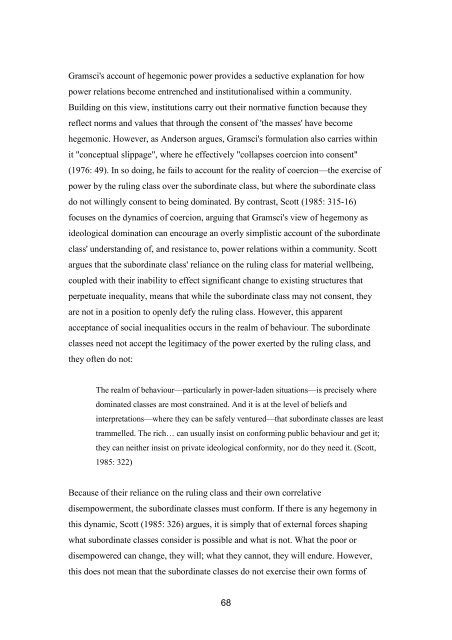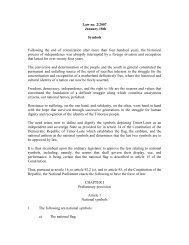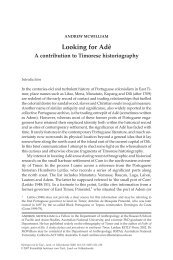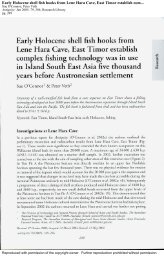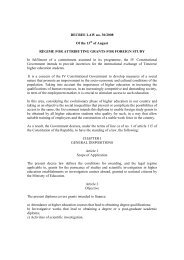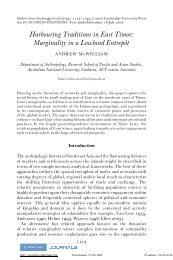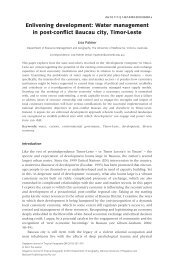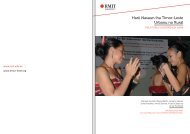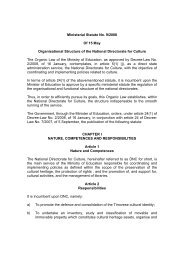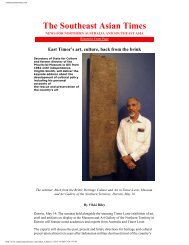Local Governance in Timor-Leste - Secretaria de Estado da Arte e ...
Local Governance in Timor-Leste - Secretaria de Estado da Arte e ...
Local Governance in Timor-Leste - Secretaria de Estado da Arte e ...
- No tags were found...
You also want an ePaper? Increase the reach of your titles
YUMPU automatically turns print PDFs into web optimized ePapers that Google loves.
Gramsci's account of hegemonic power provi<strong>de</strong>s a seductive explanation for howpower relations become entrenched and <strong>in</strong>stitutionalised with<strong>in</strong> a community.Build<strong>in</strong>g on this view, <strong>in</strong>stitutions carry out their normative function because theyreflect norms and values that through the consent of 'the masses' have becomehegemonic. However, as An<strong>de</strong>rson argues, Gramsci's formulation also carries with<strong>in</strong>it "conceptual slippage", where he effectively "collapses coercion <strong>in</strong>to consent"(1976: 49). In so do<strong>in</strong>g, he fails to account for the reality of coercion—the exercise ofpower by the rul<strong>in</strong>g class over the subord<strong>in</strong>ate class, but where the subord<strong>in</strong>ate classdo not will<strong>in</strong>gly consent to be<strong>in</strong>g dom<strong>in</strong>ated. By contrast, Scott (1985: 315-16)focuses on the dynamics of coercion, argu<strong>in</strong>g that Gramsci's view of hegemony asi<strong>de</strong>ological dom<strong>in</strong>ation can encourage an overly simplistic account of the subord<strong>in</strong>ateclass' un<strong>de</strong>rstand<strong>in</strong>g of, and resistance to, power relations with<strong>in</strong> a community. Scottargues that the subord<strong>in</strong>ate class' reliance on the rul<strong>in</strong>g class for material wellbe<strong>in</strong>g,coupled with their <strong>in</strong>ability to effect significant change to exist<strong>in</strong>g structures thatperpetuate <strong>in</strong>equality, means that while the subord<strong>in</strong>ate class may not consent, theyare not <strong>in</strong> a position to openly <strong>de</strong>fy the rul<strong>in</strong>g class. However, this apparentacceptance of social <strong>in</strong>equalities occurs <strong>in</strong> the realm of behaviour. The subord<strong>in</strong>ateclasses need not accept the legitimacy of the power exerted by the rul<strong>in</strong>g class, andthey often do not:The realm of behaviour—particularly <strong>in</strong> power-la<strong>de</strong>n situations—is precisely wheredom<strong>in</strong>ated classes are most constra<strong>in</strong>ed. And it is at the level of beliefs and<strong>in</strong>terpretations—where they can be safely ventured—that subord<strong>in</strong>ate classes are leasttrammelled. The rich… can usually <strong>in</strong>sist on conform<strong>in</strong>g public behaviour and get it;they can neither <strong>in</strong>sist on private i<strong>de</strong>ological conformity, nor do they need it. (Scott,1985: 322)Because of their reliance on the rul<strong>in</strong>g class and their own correlativedisempowerment, the subord<strong>in</strong>ate classes must conform. If there is any hegemony <strong>in</strong>this dynamic, Scott (1985: 326) argues, it is simply that of external forces shap<strong>in</strong>gwhat subord<strong>in</strong>ate classes consi<strong>de</strong>r is possible and what is not. What the poor ordisempowered can change, they will; what they cannot, they will endure. However,this does not mean that the subord<strong>in</strong>ate classes do not exercise their own forms of68


